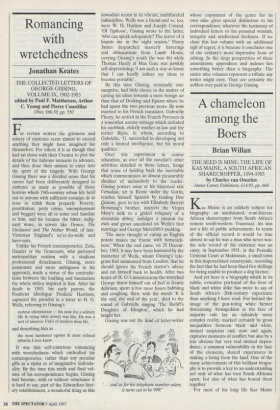Romancing with wretchedness
Jonathan Keates
THE COLLECTED LETTERS OF GEORGE GISSING, VOLUME IX, 1902-1903 edited by Paul F. Mattheisen, Arthur C. Young and Pierre Coustillas Ohio, £66.50, pp. 550 For certain writers the grimness and misery of existence seem almost to exceed anything they might have imagined for themselves. For others it is as though they had sat down with their Creator to plot the details of the hideous scenario in advance, and then done their utmost to enter into the spirit of the tragedy. With George Gissing there was a decided sense that his career had been deliberately designed to embrace as many as possible of those horrors which 19th-century urban life held out to anyone with sufficient nostalgie de la boue to relish them properly. Poverty, prostitution, petty crime, unemployment and beggary were all in some sort familiar to him, and his became the bitter, indig- nant muse, in novels like Demos, The Unclassed and The Nether World, of late- Victorian England's ne'er-do-wells and have-nots.
Unlike his French contemporaries, Zola, Daudet or the Goncourts, who purveyed metropolitan realism with a studious professional detachment, Gissing, more passionate and more ambiguous in his approach, made a virtue of the contradic- tions between the loathing and fascination the whole milieu inspired in him. After his death in 1903, his early patron, the Positivist ideologue Frederic Harrison, captured the paradox in a letter to H. G. Wells, referring to Gissing's curious idiosyncrasy — his taste for a solitary life & trying what misery was like. He was a sort of amateur Fakir of modern slum life, and describing him as the most hardened egotist & most refined sybarite I ever knew.
It was this self-conscious romancing with wretchedness which enthralled his contemporaries, rather than any peculiar gifts as a stylist or of imaginative individu- ality. By the time this ninth and final vol- ume of his correspondence begins, Gissing had become, with or without reluctance it is hard to say, part of the Edwardian liter- ary establishment, a wonderful thing as this nowadays seems in its vibrant, multifaceted indiscipline. Wells was a friend and so, too, were W. H. Hudson and Joseph Conrad. `Of Typhoon', Gissing wrote to the latter, `who can speak adequately? The terror of it haunts me in the night season.' Henry James despatched masterly haverings and obfuscations from Lamb House, envying Gissing's youth (he was 46) while Thomas Hardy at Max Gate was pawkily self-depreciating: 'I am such a stay-at-home that I can hardly induce my ideas to become portable'.
By this time Gissing, terminally con- sumptive, had little choice in the matter of carting his ideas towards a more benign air than that of Dorking and Epsom where he had spent the two previous years. By now married to his French translator, Gabrielle Fleury, he settled in the French Pyrenees in a somewhat uneasy ménage which included his snobbish, elderly mother-in-law and the terrier Bijou, in whom, according to Gabrielle, 'G. succeeded in developing not only a limited intelligence, but his moral qualities'.
Over this experiment in canine education, as over all the novelist's other activities detailed in these letters, hangs that sense of holding back the inevitable which communicates an almost pleasurable shudder of melancholy to the reader. Gissing potters away at his historical tale Vernalida, set in Rome under the Goths, teaches himself Spanish by reading Don Quixote, goes to tea with Elizabeth Barrett Browning's brother, inspects the Virgin Mary's milk in a gilded reliquary of a mountain abbey, indulges a passion for owls and grows anecdotal on Wells's first marriage and George Meredith's pudding.
`The mere thought of eating an English potato makes me frantic with homesick- ness.' When the end came, on 28 Decem- ber, 1903, it may have been hastened by the insistence of Wells, whom Gissing's tele- gram had summoned from London, that he should ignore his French doctor's advice and eat himself back to health. After two hours of H. G.'s ministrations the wretched George threw himself out of bed in frantic delirium, spent a few more hours babbling and coughing, then, with the words 'It is the end, the end of the year', died to the sound of Gabrielle singing 'The Bailiff's Daughter of Islington', which he had taught her.
Gissing was not the kind of letter-writer . . and as for his telephone number salary, it turns out to be 999!' whose enjoyment of the genre for its own sake gives special distinction to his correspondence, whatever the testimony of individual letters to his personal warmth, integrity and intellectual liveliness. If we close this last volume with an additional sigh of regret, it is because it concludes one of the century's most impressive feats of editing. In the deep perspectives of these annotations, appendices and indexes lies something better than a biography. The entire nine volumes represent a tribute any writer might envy. They are certainly the noblest ever paid to George Gissing.


























































 Previous page
Previous page